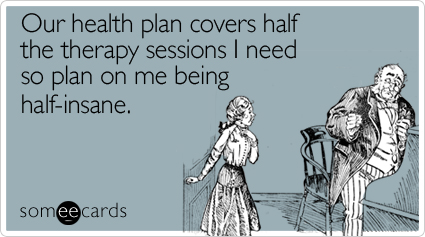You can take your pick from ancient pagan rituals designed to appeal to the gods to modern electroencephalographic machinery (yes, there is a gadget that shoots magnetic impulses into your brain!). A heavily researched list would be too long and too impractical to write or read. You probably just want to know what’s most available to you here and now.
FACT: There is no relationship between insurance coverage and therapeutic effectiveness.
FACT: The modern word therapy comes from Latin meaning “to tend to and care for the soul.” Just remember that next time some therapist insists that you have to figure everything out with your conscious mind. Uh….. contemplative prayer, anyone?
If you’re looking for help, consider these:
Talk therapy – Psychotherapeutic counseling dialog between you and the therapist. It can be tough and can dredge up tears. Or it can feel like head games. Works with your conscious waking mind to find solutions to current problems. Most common style Cognitive-Behavioral therapy.
Hypnotherapy – Ancient technique now used in hospitals and clinics worldwide for things like pre- and post-operative anxiety and pain relief. Recently popularized by Dr. Milton Erickson. Uses a trance to quiet the conscious waking mind while making spoken behavioral suggestions to the powerful subconscious mind where all your “programming” resides. Can replace fears, phobias, bad habits and moods with healthy alternative.
Jungian Analysis / Depth Psychotherapy – Talk therapy which also uses active imagination exercises, study of myth and symbolism and dream analysis to reach into the unconscious mind and locate/use the psychic energy in the soul and spirit to infuse meaning into life. Dr. Carl Jung conceived this work, but its origins likely reach back millennia.
Mindfulness Meditation– Buddhist practice medically proven to give powerful neurological benefits, mental clarity, concentration ability. Even leads to spiritual insights. Many different forms including vipassana, Zen, insight meditation. Based on teaching of Siddhartha Gotama (350 b.c.). Best to learn from an authentic teacher who follows a historical lineage, not a pop psychologist who has jumped on the mindfulness bandwagon.
Gestalt / Existential – Based on the assumption that you alone are responsible for your thoughts, feelings and actions. If you want a meaningful life, you have to quit whining, look reality in the face and do something about it. Stems from the work of Camus, Sartre and Fritz Perls.
Paradoxical Intention – Read Man’s Search for Meaning by psychiatrist Viktor Frankl to understand this brave therapy. It motivates you to take complete responsibility for the choices you make when you’re faced with seemingly impossible problems. Frankl encourages you to do whatever takes the most courage.
Psychiatry – Some people are genuinely mentally ill and can even be dangerous to themselves or others. Psychopharmaceuticals are controversial, but they can stop the mayhem caused by psychotic people. Just don’t expect your psychiatrist to do therapy.
Contemplative Prayer – Saint John of the Cross (Dark Night of the Soul,1580), Saint Teresa of Avila (The Interior Castle, 1575) and Father Thomas Keating (The Contemplative Journey, 2000) teach the inspiration that can come from complete surrender of the ego and full offering of the heart to God in Christian mysticism. Way more charming than being told by a clinical psychologist that you have spiritual delusions.
Share this Post

